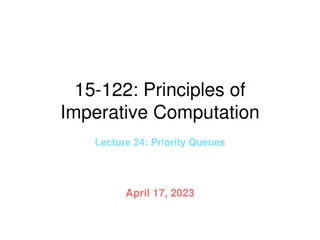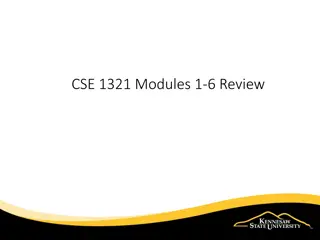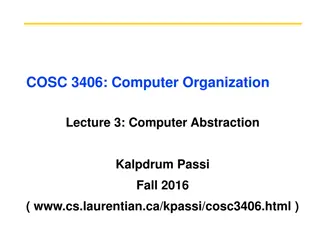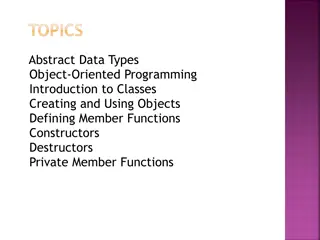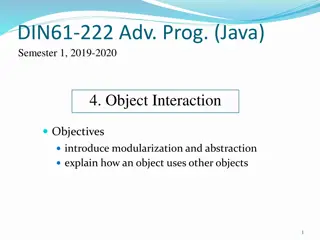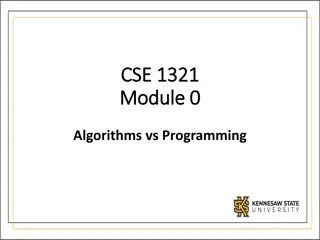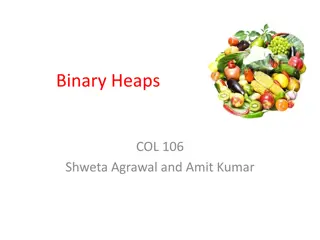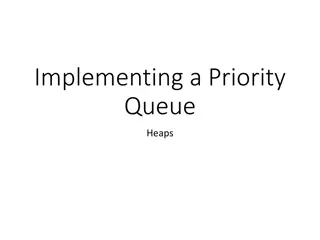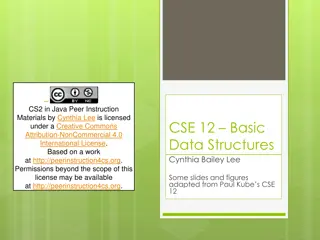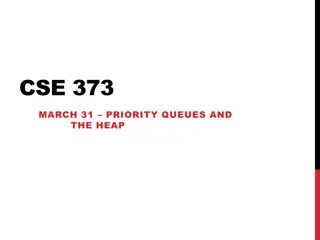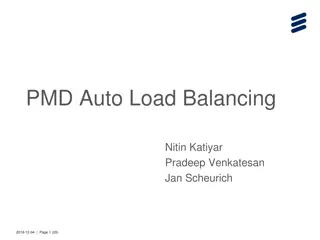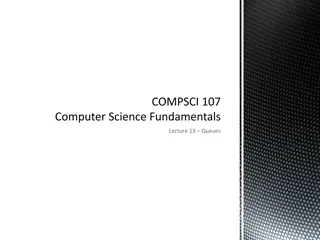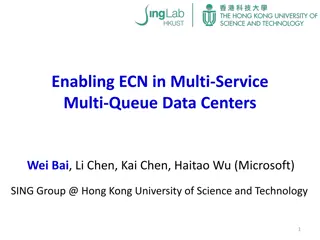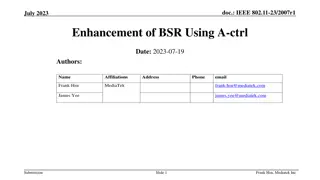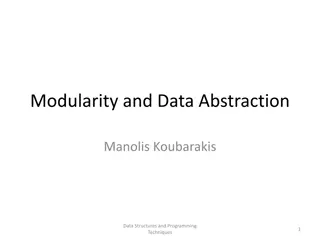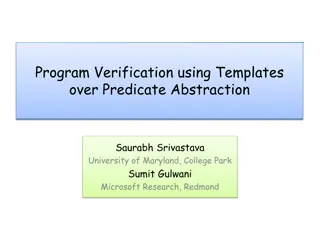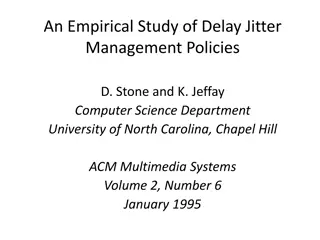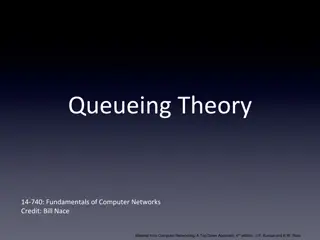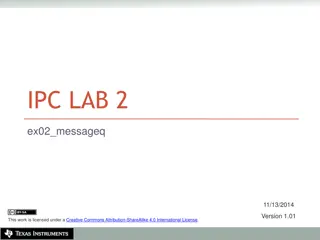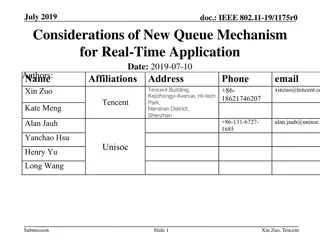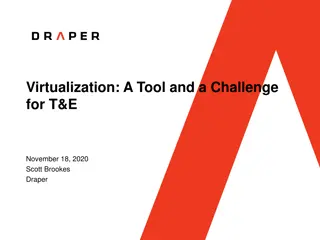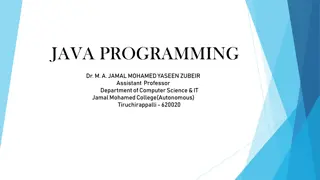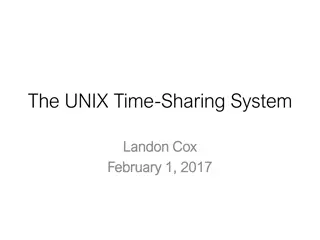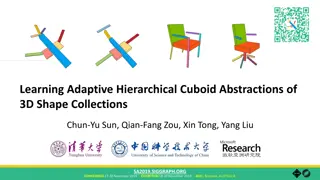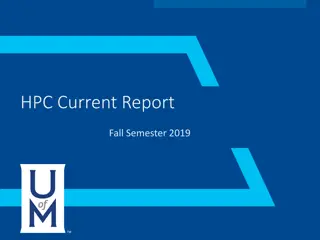15-122: Principles of Imperative Computation.
Explore the fundamentals of priority queues, including how they prioritize elements based on specific criteria, such as emergencies or deadlines. Learn about key operations like adding and retrieving elements, with examples from different real-world scenarios. Delve into creating a Priority Queue In
1 views • 45 slides
Understanding Algorithms and Programming Fundamentals
Learn about algorithms, programming, and abstraction in computing. Explore the definition and properties of algorithms, the relationship between algorithms and programming, and the concept of abstraction. Discover how algorithms are like recipes and how abstraction simplifies complex tasks in comput
1 views • 17 slides
Moorfields Volunteers Initiative: Supporting the NHS with Dedicated Service
Volunteers at Moorfields, led by Angela Smith, have played a pivotal role in assisting the hospital's pandemic response and ongoing operations. The current volunteer roles encompass a wide range of responsibilities from queue management to providing clinic support. Notably, Theatre Support Volunteer
2 views • 12 slides
Network Function Abstraction A delicate question of (CPU) affinity?
Exploring the delicate balance of CPU affinity in network function abstraction, including challenges, benefits, and solutions like CPU pinning for network workloads. Learn about the impact on performance and scalability, as well as the importance of proper configuration in virtual and physical envir
3 views • 40 slides
Understanding Algorithms and Abstraction Concepts in Programming
Exploring algorithms as logical steps to accomplish tasks and abstraction as a way to group concepts for clarity in programming. Dive into flowcharts for sorting algorithms, pseudocode skeletons, and code snippets in various languages like C#, Java, and C++. Learn about handling variables and user i
2 views • 48 slides
Federal Energy Regulatory Commission Transmission Update - Nov. 3, 2023
FERC, led by Director Rob Thormeyer, regulates natural gas wholesale facilities, interstate pipelines, onshore LNG facilities, wholesale electric market rates, and more. The Commission consists of five appointed Commissioners overseeing key initiatives like transmission planning proposals and interc
0 views • 14 slides
Understanding Queuing Theory and Its Applications in Operations Research
Queuing theory is a mathematical study of waiting lines, or queues, commonly applied in operations research to predict queue lengths and waiting times. It helps businesses make decisions regarding resource allocation for efficient service provision. This field also encompasses queue discipline and E
1 views • 10 slides
Understanding Computer Abstraction and Performance Metrics
Computer abstraction, instruction count, CPI, and performance metrics like clock cycles, CPU time, and program execution are crucial concepts in computer organization. Through examples and detailed explanations, this lecture explores how architecture, instruction sets, compilers, and algorithms impa
0 views • 27 slides
Computational Thinking, Algorithms & Programming Overview
This unit covers key concepts in computational thinking, including decomposition, abstraction, and algorithmic thinking. Decomposition involves breaking down complex problems, abstraction focuses on identifying essential elements, and algorithmic thinking is about defining clear instructions to solv
1 views • 5 slides
Introduction to Object-Oriented Programming and Data Abstraction
Introduction to object-oriented programming concepts including classes, objects, member functions, constructors, destructors, and abstract data types. Exploring the principles of abstraction in software development, passing objects to functions, and understanding the limitations of procedural progra
0 views • 47 slides
Understanding Modularization and Abstraction in Object-Oriented Programming
Modularization in programming involves breaking down complex problems into simpler sub-parts, while abstraction allows combining low-level details into higher levels. By using modules and abstract classes, software development becomes more manageable and efficient, especially in object-oriented prog
0 views • 39 slides
Formal Verification and Automata Abstraction in Esterel
This content delves into the applications of formal verification and automata abstraction in Esterel, focusing on techniques such as verification by abstraction of automata, boolean verification using BDDs, bounded model checking in SAT/SMT, and more. The work of Gérard Berry at the Collège de Fra
0 views • 38 slides
Understanding the Non-Blocking Michael Scott Queue
The Non-Blocking Michael Scott Queue, presented by Gurudatta Patil, is a thread-based data structure where threads help each other in managing a queue efficiently. Threads collaborate to add nodes at the tail and remove them from the head, ensuring smooth operation even in a non-empty queue scenario
0 views • 17 slides
Understanding Algorithms and Programming: A Visual Introduction
Explore the fundamental concepts of algorithms and programming through visual representations and practical examples. Learn about algorithmic thinking, abstraction, recipe-like algorithms, and the importance of logical steps in accomplishing tasks. Discover how algorithms encapsulate data and instru
1 views • 17 slides
Understanding Priority Queues and Heaps
Priority queues differ from regular queues by maintaining an ordering of items based on priority rather than first-in-first-out. Items in a priority queue are assigned priority values and the highest priority item is removed first. Different data structures can be used to efficiently insert and remo
0 views • 54 slides
Understanding Binary Heaps: Efficient Data Structure for Priority Queue Operations
Explore the concept of binary heaps, a specialized type of binary tree that allows for quick retrieval of the smallest (or largest) element. Learn how binary heaps excel in finding the minimum value, essential for priority queue applications in operating systems, event simulations, and more. Compare
2 views • 34 slides
Implementing a Priority Queue with Heaps
Learn about implementing a priority queue using heaps. Priority queues are essential data structures that maintain a special ordering property. The use of binary trees and heaps is explained in detail, focusing on maintaining shape and heap properties during insertions.
0 views • 57 slides
Priority Queues in Java: Implementation and Use Cases
Explore the concept of priority queues in Java, covering implementations using unsorted and sorted linked lists, as well as heaps. Learn about the differences between a queue and a priority queue through reading quizzes and discover various priority queue implementation options. Dive into priority q
1 views • 42 slides
Satisfiability Modulo Abstraction for Separation Logic with Linked Lists
This study explores the application of satisfiability modulo abstraction in separation logic with linked lists. It presents a technique using abstract interpretation concepts to handle separation logic formulas beyond previous methods, specifically focusing on over-approximating heaps that satisfy t
0 views • 41 slides
Understanding Heap Sort and Binary Search Tree Concepts
Learn about Heap Sort for sorting elements in ascending or descending order, Priority Queue as a data structure supporting key operations, Binary Trees with recursive definitions, and exercises involving priority queue operations. Explore the concepts through visual aids and examples provided in the
0 views • 18 slides
Analysis of Data Manager Survey Results in VQI Abstraction
Survey results gathered from 942 notified Data Manager users in VQI abstraction revealed insights on responsibilities, experience levels, backgrounds, and facility types. Responses indicate varying levels of involvement with data collection, team size, and number of facilities managed, providing val
0 views • 27 slides
Understanding Priority Queues and Heaps in CSE 373 Lecture
Today's lecture in CSE 373 covers the Priority Queue Abstract Data Type (ADT), the properties of heaps, and their implementations. Key topics include the completeness property of heaps, different priority queue implementations such as the binary search tree for faster insert and find operations, and
0 views • 21 slides
Automatic Load Balancing Proposal for PMD Port Queue Assignment
This proposal discusses dynamic port queue assignment strategies for PMDs in network environments. It covers both static and dynamic assignment methods, such as round-robin and cycles-based algorithms, to ensure uniform load distribution. The proposal introduces an automatic load balancing feature,
0 views • 20 slides
Understanding Queues in Computer Science: Principles and Implementations
Explore the concept of queues in computer science, focusing on ordered collections of data following the FIFO principle. Learn about queue ADTs, implementations in Python, and delve into a simulation of a Printer Queue problem. Discover how to model printing tasks as random events and analyze the im
0 views • 15 slides
Enhancing Data Center Performance with ECN-Based Transports
This study focuses on enabling Explicit Congestion Notification (ECN) in multi-service, multi-queue data centers to cater to diverse network requirements. ECN-based transports like DCTCP and DCQCN achieve high throughput and low latency by allowing end-hosts to react to ECN signals and switches to p
0 views • 65 slides
Exploring Abstraction in Mathematics: Insights from MAA MathFest 2022
Delve into the concept of abstraction with a focus on diverse perspectives, historical influences, pedagogical approaches, and the process of abstraction itself as discussed at MAA MathFest 2022. Engage with enlightening comparisons and references shedding light on this fundamental mathematical prin
0 views • 7 slides
Understanding Portraits: Realism, Abstraction, and Representation
Delve into the world of portraiture with a focus on realism and abstraction, exploring how artists like Cézanne, Vermeer, and Picasso depict their subjects. Learn the significance of portraits, the difference between realistic and abstract art, and the impact of color on portraying emotions and pro
0 views • 7 slides
Enhancement of Buffer Status Reporting in IEEE 802.11 - A Solution Proposal
This document proposes enhancements to the Buffer Status Reporting (BSR) mechanism in IEEE 802.11, particularly addressing the issue of inaccuracies in reporting queue sizes exceeding 2,147,328 octets within PPDU frames. The proposal suggests adding an additional field in the A-ctrl frame to accommo
0 views • 9 slides
Understanding Modularity and Data Abstraction in Programming
Learn about the importance of procedural abstraction, information hiding, modules, and abstract datatypes in programming. Discover how these concepts help in structuring large programs, improving maintainability, and enhancing data organization and operation control.
0 views • 56 slides
Program Verification Using Templates Over Predicate Abstraction
This research explores a technique that allows for inferring invariants with arbitrary quantification and boolean structure, improving the state-of-the-art in program verification. It can infer weakest preconditions, helping with debugging and analysis by discovering worst-case inputs and missing pr
0 views • 32 slides
An Empirical Study of Delay Jitter Management Policies
This study explores delay jitter management policies to support interactive audio over LANs, focusing on display queue management to minimize gaps in playout. The paper evaluates different queue management policies, including I-policy and E-policy, along with queue monitoring in the context of an em
0 views • 37 slides
Understanding Queueing Theory in Computer Networks
Queueing theory is a powerful analytic tool used to analyze performance in queueing processes, applicable in various industries including retail, manufacturing, and computer networks. It involves studying characteristics such as arrival patterns, service patterns, and queue disciplines to make perfo
0 views • 61 slides
IPC Lab 2 MessageQ Client/Server Example
This MessageQ example demonstrates the client/server pattern using SYS/BIOS heap for message pool, anonymous message queue, and return address implementation. The example involves two processors - HOST and DSP, where the DSP processor acts as the server creating a named message queue, and the HOST p
0 views • 12 slides
New Queue Mechanism for Real-Time Application Considerations in July 2019
In July 2019, considerations were made for a new queue mechanism for real-time applications. The focus was on improving worst-case latency and jitter for latency-critical traffic, such as in online mobile gaming and manufacturing control. The proposed design aims to link access delay directly to req
0 views • 9 slides
Understanding Virtualization: Hardware Abstraction and Hypervisor Concepts
Dive into the world of virtualization with a focus on hardware abstraction and hypervisor technology. Explore the definitions and examples of hardware virtualization, hypervisors, and hardware abstraction, shedding light on how they enable multiple operating systems to coexist on a single physical m
0 views • 21 slides
Fundamentals of Object-Oriented Programming in Java
Object-Oriented Programming (OOP) is a methodology that simplifies software development by using classes and objects. This paradigm includes concepts like Object, Class, Inheritance, Polymorphism, Abstraction, and Encapsulation. Other terms used in OOP design include Coupling, Cohesion, Association,
0 views • 54 slides
Evolution of Data Abstraction in Operating Systems
Explore the evolution of central data abstraction in operating systems from the complexity of Multics to the simplicity and elegance of Unix. Discover how files are managed in Unix, the tradeoffs in data-sharing methods, and the impacts on efficiency and protection.
0 views • 41 slides
Innovative 3D Shape Abstraction Research at SIGGRAPH 2019
Explore the cutting-edge research on adaptive hierarchical cuboid abstractions and 3D shape structures presented at SIGGRAPH 2019. The goal is to construct a good 3D abstraction for shapes, focusing on compactness, expressiveness, adaptiveness, and consistency.
0 views • 56 slides
Overview of Fall Semester 2019 HPC Current Report
The Fall Semester 2019 HPC Current Report highlights changes made in resource allocation, job queue management, utilization analysis, and factors influencing job priority. Key modifications include adjusting memory per CPU, implementing limit enforcement, and changing fairshare weights. The report d
0 views • 20 slides
Understanding Game Abstraction and Equilibrium
Extensive-Form Game Abstraction with Bounds delves into the complexities of game abstraction, exploring theoretical guarantees, algorithmic challenges, and equilibrium-finding processes. The difficulty of game abstraction is examined, highlighting issues such as pathologies and the struggle to optim
0 views • 22 slides
